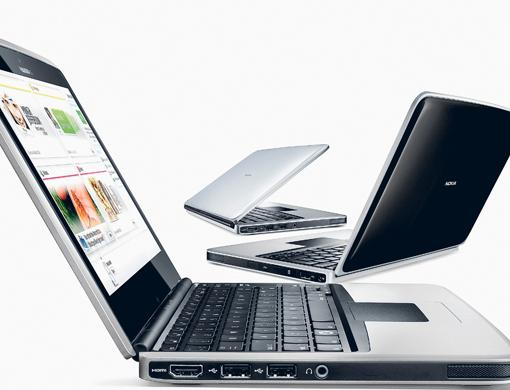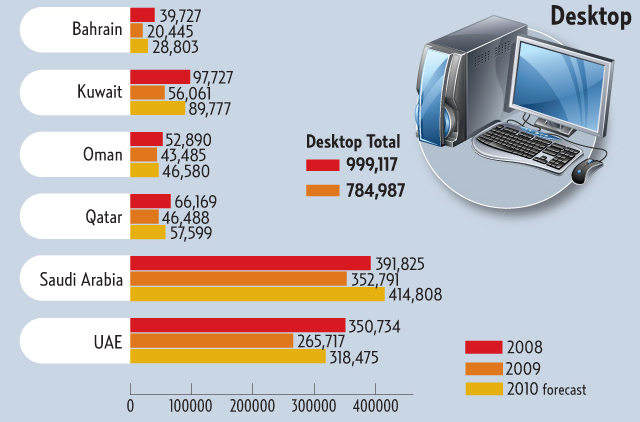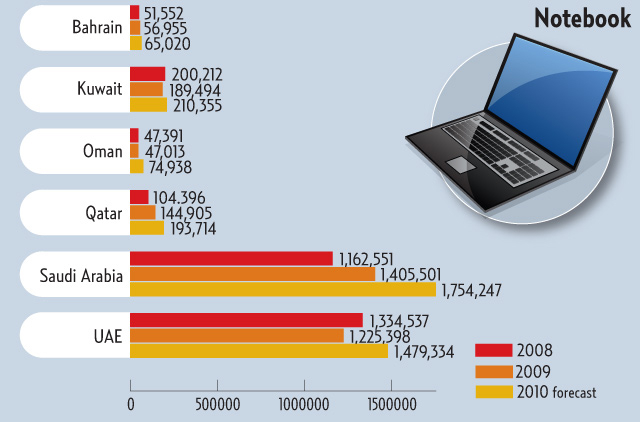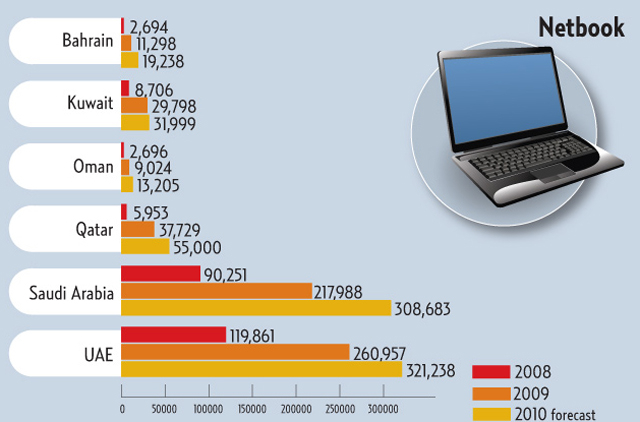
Dubai: Personal computer (PC) shipments (desktops, notebooks and netbooks) across the Gulf countries increased around 7 per cent last year despite tough economic conditions, according to industry experts.
"2009 was better than we expected. When 2009 started, there was lot of panic in the market and we revised our forecasts dramatically. The forecast was revised every month whenever new economic data came out. From an overall perspective, desktops were in line with our forecast while notebooks grew beyond our expectations fuelled by strong demand for netbooks," Omar Shihab, Research Manager, PCs and Systems, IDC Middle East and Africa, told Gulf News.
He said the positive side was the growth in mini notebooks or netbooks. Netbooks contributed 15.6 per cent of notebook sales.
Some of the growth in the netbook market is a function of cannibalisation of entry-level notebook PCs, but the factors which helped propel the mini-note market — low average selling price and basic functionality — remain the key forces propelling growth.
Total PC shipments last year were 4.42 billion units compared to 4.13 billion in 2008. Desktop shipments fell more than 21 per cent to 784,987 units last year compared to 999,117 while notebook shipments grew 3.45 per cent to 3 billion units compared to 2.9 billion units and netbook shipments grew a whopping 146.26 per cent to 566,794 units compared to 230,161 in 2008.
Desktops suffer
Desktops contributed around 17.80 per cent of the total PC sales while notebooks contributed 69.30 per cent and netbooks 12.90 per cent last year.
Shihab said even though shipments grew in unit terms, value wise it fell 4.61 per cent to $3.66 billion (Dh13.43 billion) compared to $3.84 billion in 2008.
"Desktop sales were always driven by corporates and small- and medium-size businesses. Notebooks have become an essential item for consumers. It is no longer a luxury item or an option, it is a must have item for productivity and entertainment. Netbooks are going to stay despite lower margins and tough competition," Shihab said.
Qatar and Saudi Arabia made major contributions to the growth last year. Qatar grew fastest among the Gulf countries at 29.80 per cent year-on-year and Saudi Arabia 20.12 per cent while the rest of the Gulf countries had negative year-on-year growth.
The UAE suffered the least year-on-year fall of 2.77 per cent followed by Oman at 3.36 per cent, Bahrain 5.61 per cent and Kuwait 11.20 per cent.
"All the Gulf countries registered a huge fall in desktop sales as they were coming from enterprise replacements, demand from small- and medium-businesses [SMB] and small government projects. Last year, enterprises delayed their replacements. SMBs are the ones who immediately stopped the purchase during the crisis. They are the ones immediately hit," Shihab said.
In desktops, Bahrain registered the worst fall, 48.54 per cent, followed by Kuwait with 42.66 per cent, Qatar with 29.74 per cent, the UAE 24.24 per cent, Oman 17.78 per cent and Saudi Arabia 9.96 per cent. In the notebook sector, Qatar grew fastest at 38.80 per cent followed by Saudi Arabia 20.69 and Bahrain 10.48 per cent while the other Gulf countries witnessed a fall. The UAE fell 8.27 per cent while Kuwait fell 6.85 per cent and Oman 0.79 per cent.
In the netbook sector, all the Gulf countries showed tremendous growth. Qatar grew fastest at 533.78 per cent followed by Bahrain 319.38 per cent, Kuwait 242.27 per cent, Oman 234.72 per cent, Saudi Arabia 141.53 per cent and the UAE 117.72 per cent.
"Telco channels have become a new channel for fuelling growth in the netbook market. Telco providers are not bothered about brands as long as vendors offer discount, delivery and prompt after sales service.
"Telcos are providing netbooks along with a subscription especially in Saudi Arabia," Swapna Subramani, associate research analyst, MEA (Middle East and Africa) region, IDC, told Gulf News.
Shihab said telco channels, retailers, malls and exhibitions like Gitex and DSF were offering promotions to make the notebook sales very attractive to customers. In UAE, major malls were offering promotions to make it attractive apart from top vendors.
Felix Baretto, Business Manager, PC division, LG Electronics said: "PC market in the Gulf will see incremental growth compared to 2009 with the introduction of new CPU [central processing units] and OS [operating systems] by the manufacturers which will attract new technology and drive the consumer towards it."
Subramani said unbranded vendors contributed 4 per cent to the market last year. In the UAE, around 35 per cent to 40 per cent of the notebooks are re-exported to Iran, East Africa, CIS (Commonwealth of Independent States), Pakistan and some Gulf and Middle Eastern countries.
She said Samsung, Sony and LG were very aggressive last year. LG grew 160 per cent in notebooks. HP fell by 6 per cent while Acer and Dell grew by 12 per cent.
Atoms fuel growth: Intel
"2009 was a challenging year. When we look at specific technology trends that sustained the growth through this difficult period, mobile technology and specifically the notebook and netbook segments stand out as clear winners. The internet and being able to stay connected seems to be last thing consumers are willing to give up after music, DVDs, books, games and mobile phones, according to Morgan Stanley. The Intel Atom processor, Intel's smallest processor has been fuelling this growth due to its power-efficiency," Nasser Nauthoa, Intel general manager for the Gulf, said.
"There's little doubt that the humble PC in its many forms will continue to be popular. Increasing personalisation and diversification of laptop designs helps to drive demand for these products. Whether the need is for a high-end gaming system with a large screen, a highly portable thin and light laptop for maximum mobility or an office workhorse with the uncompromising performance and the best battery life the choices are being provided by the PC vendors to both business and consumers. Of course businesses will use the opportunity of Microsoft's Windows 7 introduction to replace their aging laptops and desktops for newer more fully featured ones. The prospects for a pickup in PC sales volumes in 2010 look positive," Nauthoa said.














